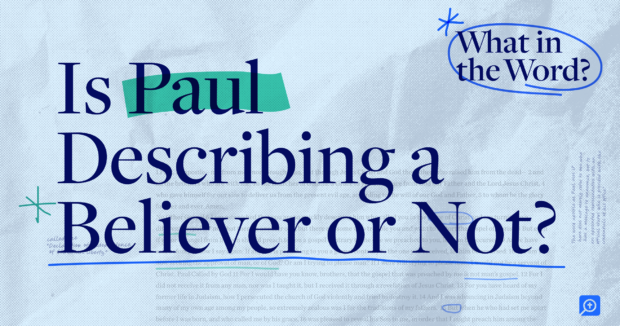Does Romans 7 describe the expertise of a believer fighting sin, or is Paul referring to one thing else solely? Many in Protestant traditions assume that Paul’s use of “I” on this passage displays the believer’s ongoing wrestle with sin. However others problem this view with sturdy exegetical arguments.
On this episode of What in the Word?, host Kirk E. Miller is joined by Joseph (Joey) R. Dodson, Craig L. Blomberg Endowed Chair of New Testomony at Denver Seminary, to discover one of the vital debated passages within the New Testomony: Romans 7:7–25. Collectively, Kirk and Joey look at key interpretive questions, examine totally different viewpoints, and talk about how Romans 7 matches into the broader context of Paul’s argument in Romans 6–8.
Comply with the present on YouTube, Spotify, Apple Podcasts, and extra.
Particular presents


A Free Guide Only for You
Logos has given away over 5 million free books, empowering Christians globally to check deeply. Get a shiny, new free guide each month!


Unique Lexham Press Robust Texts Bundle
Have extra questions in regards to the Bible? Get the 10-volume Lexham Press Robust Texts Bundle designed solely for followers of What within the Phrase?
Join with us
Prepared to extend biblical literacy? Like and share. To go the additional mile, depart us a assessment in your most well-liked platform.
Subscribe to get future episodes. (Bonus: We’ll ship you a reduction to make use of in your first buy.)
Thanks for subscribing to Phrase by Phrase!
Use code WORDBYWORD to save lots of 10% in your first order.
WORDBYWORD
Copy code
Episode visitor: Joseph Dodson
Joseph (Joey) R. Dodson is the Craig L. Blomberg Endowed Chair of New Testomony at Denver Seminary, a non secular research professor at Purdue College, and a pastor at New Denver Church. Joey studied on the College of Aberdeen in Scotland after which went on to the College of Tübingen in Germany. His most up-to-date guide is Conquerors Not Captives: Reframing Romans 7 for the Christian Life. Joey brings years of scholarly expertise and pastoral engagement, with a deal with the intersection of Second Temple Judaism, early Christianity, and Greco-Roman philosophy.
An avid hiker, Joey has climbed numerous mountains around the globe—together with two-thirds of “the 14ers” within the contiguous US, in addition to a “17er” in Peru. Extra importantly, Joey married his elementary college sweetheart, Sadie. They’ve been married now for thirty years. Joey and Sadie have 5 youngsters, a son-in-law, a daughter-in-law, and the best granddaughter and two grandsons in your entire multiverse.
Episode synopsis
Who’s the “I” in Romans 7:7–25?
Interpretive controversy exists over Paul’s use of the first-person pronoun “I” in Romans 7:7–25. The core of the talk is that this: When Paul says issues like, “I don’t do what I need, however I do the very factor I hate” (Rom 7:15), whose expertise is he describing?
Is that this the expertise of a believer or non-believer?
How one solutions the above query has implications for whether or not Paul is portraying his post-conversion situation as a Christian fighting sin, or whether or not that is the situation of 1 beneath the regulation and never but remodeled by grace. Thus, interpretations fall into both of two camps:
- The autobiographical view: Paul is describing his personal post-conversion wrestle with sin.
- The impersonation view: Paul is portraying another person—presumably Israel, Adam, or a generic individual beneath the regulation.
Joey’s view aligns with the latter: He believes Paul is impersonating an individual beneath the regulation who will not be but a believer empowered by the Spirit.
Historic interpretations: Augustine to the Reformers
Joey walks via some historical past of interpretation, noting that earlier church fathers like Origen didn’t see Romans 7 as autobiographical. Origen, a local Greek speaker, argued that Paul was doing prosopopoeia—a rhetorical impersonation.
Augustine initially held this view, however later modified his interpretation in response to Pelagianism, utilizing Romans 7 to emphasize the continuing wrestle with sin.
The Reformers, particularly Luther and Calvin, amplified this latter view. They learn Romans 7 as an outline of the believer’s day by day battle with sin. This interpretation has formed a lot of Protestant theology for hundreds of years.
Impersonation views: Adam, Israel, or legalist
Joey outlines a number of numerous impersonation views:
- Adam: Paul speaks from the angle of Adam, the primary individual to sin upon receiving a commandment (see particularly Rom 7:7–11). We additionally recall that Romans 5 has already spoken of Adam.
- Israel: Paul embodies Israel’s tragic expertise beneath the regulation as recorded all through the Previous Testomony.
- A generic individual beneath the regulation: Paul adopts the voice of any human sure by regulation however with out the Spirit.
Every view stresses the impotence attributable to making an attempt to maintain the regulation with out God’s transformative grace.
Setting the stage: the context of Romans 5–8
As one explores the above interpretive choices, Joey and Kirk encourage listeners to think about the circulate of thought from Romans 5 via Romans 8.
In Romans 5, Paul lays out the blessings of justification—peace with God, pleasure in struggling, and hope rooted in divine love. Romans 6 underscores that believers are useless to sin and alive to God, having been united with Christ in demise and resurrection. Romans 7, then, sits in the course of an arc, serving as a hinge: Whereas chapter 6 asserts freedom from sin and chapter 8 celebrates life within the Spirit, Romans 7 takes a step again to look at the regulation’s position in human sinfulness.
As we’ve seen, Paul’s argument in Romans 5–8 is deeply structured, and this broader construction should be accounted for once we interpret the particulars of Romans 7:7–25.
Rhetorical methods & imagery in Romans 6–8
Kirk and Joey observe how Paul makes use of rhetorical inquiries to construction his argument all through the guide of Romans—Romans 6–8 being no exception (Rom 6:1–3, 15–16; 7:1, 7, and 13; see additionally 6:21 and seven:24). Such questions are a typical machine in Greco-Roman diatribe.
Kirk and Joey additionally observe how, together with these rhetorical markers, Paul employs diversified imagery to convey a unified thought. Three key metaphors emerge in Romans 6:1–7:6:
- Baptism: Dying to the ability of sin and resurrection to new life in union with Christ’s personal demise and resurrection (roughly Rom 6:1–14).
- Slavery: Launch from our slavery to sin and, after receiving a brand new grasp, changing into slaves to righteousness (roughly Rom 6:15–23)
- Marriage: Dying to the regulation, changing into a widower to it, and belonging to a brand new “husband,” Christ (Rom 7:1–6)
Every of those photographs appear to be other ways to discuss the identical change in standing. Thus, when Paul speaks of believer having “died to the regulation” in Romans 7:4, that is coextensive with their having died to sin in Romans 6:1–14. Likewise, his depiction of believers having been “launched from the regulation” in Romans 7:6 overlaps with their launch from sin’s bondage in Romans 6:15–23.
This means that Paul’s instantly following description in Romans 7:7–25, detailing expertise beneath the regulation, stands in distinction to the believer’s present state, as portrayed in Romans 6.
The programatic position of Romans 7:4–6
Additional, Romans 7:5–6 outlines Paul’s two broad actions in what follows. First, he summarizes life beneath the regulation as animated by the flesh (Rom 7:5), which he’ll unpack in Romans 7:7–25. This he contrasts with life within the new covenant, defined by the Spirit’s work in our lives (7:6), which he’ll decide up in Romans 8:1.
|
Life beneath the regulation within the flesh (7:5) |
Life within the Spirit (7:6) |
|
Life beneath the regulation within the flesh elaborated (7:7–25) |
Life within the Spirit elaborated (8:1–17) |
Why Romans 7 doesn’t depict the Christian life
Joey goes on to problem the autobiographical view on a number of fronts:
- Contradiction with Romans 6 and eight: In Romans 6, Paul insists believers are not slaves to sin, and in Romans 8 they’re empowered by the Spirit. Romans 7’s language of bondage and defeat doesn’t align with this.
- Absence of the Holy Spirit: From Romans 7:7 onward, the Spirit is noticeably absent. Against this, Romans 8 overflows with Spirit-filled empowerment.
- “Sin dwelling in me” (7:17): For Joey, this language is incompatible with Paul’s educating that believers are new creations—indwelt not by sin, however by the Holy Spirit.
- Beneath the regulation: Romans 7:7–25 depicts the expertise of 1 beneath the Mosaic regulation. However arguably, Paul doesn’t see the believer as beneath the Mosaic regulation, however beneath “grace,” i.e., the brand new covenant.
Thus, all through Romans 6:1–8:17, Paul makes stark contrasts between our former and new situations. Evaluating these descriptions, we discover that Paul’s language in Romans 7:7–25 matches what he says elsewhere in Romans 6–8 to explain the pre-conversion state and is at odds with the believers’s new state.
| The state of the non-believer | The state of the believer |
|
Alive to sin (Rom 7:9; 23, 25) |
Useless to sin, alive to God (Rom 6:2, 11) |
|
Slave to sin (Rom 6:6, 16–20, 22; 7:14) |
Slave to righteousness (Rom 6:7, 16–19, 22) |
|
Previous self/humanity (Rom 6:6) |
New self/humanity (examine Eph 2:15; Col 3:9–11; Eph 4:22–24) |
|
Beneath the regulation (outdated covenant; Rom 6:14, 15; 7:4–6; 8:3) |
Beneath grace (new covenant; Rom 6:4, 14, 15; 7:6) |
|
Animated by the flesh (7:5; 7:14, 18, 25; 8:3–8, 12–13) |
Animated by the Spirit (7:6; 8:2, 4–6, 11th of September, 13–15) |
|
Leading to lawlessness & demise (Rom 6:16, 19, 21, 23; 7:5, 8–11, 13; 8:6, 13) |
Leading to sanctification & everlasting life (Rom 6:16, 19, 22–23; 7:4; 8:6, 10–11, 13) |
What in regards to the change to the current tense (7:14)?
Many who interpret Romans 7 as autobiographical, and thus indicative of the believer, level to Paul’s shift to the current tense in verse 14. Joey, nonetheless, argues, primarily based on verbal aspect theory, that this manner within the Greek doesn’t at all times point out current tense. Somewhat, it’s usually used rhetorically to accentuate the discourse.
Thus, the “current tense” in Romans 7 doesn’t essentially point out Paul is describing his present Christian life. As an alternative, it may very well be a literary technique to animate the voice of the persona whom Paul is impersonating.
The Identification of the “wretched man” (7:24)
One of many emotional peaks of Romans 7 is the cry, “Wretched man that I’m! Who will ship me from this physique of demise?” For Dodson, this isn’t a Christian lament—it’s a cry of somebody beneath the regulation, determined for salvation. The reply is available in Romans 8:1: “There’s subsequently now no condemnation for individuals who are in Christ Jesus.” Romans 8:1 signifies a shift from the hopelessness of life beneath regulation (Rom 7:7–25) to the liberation present in life via the Spirit (Rom 8).
Paul’s emphasis: the goodness but impotence of the regulation
A central theme in Romans 7 is the law’s inability to produce righteousness. Joey notes that Paul defends the regulation as “holy, righteous, and good” (7:12), however insists it was weakened by the flesh. The regulation reveals sin however can not conquer it.
This analysis units the stage for Romans 8, the place the Spirit accomplishes what the regulation couldn’t.
Suggestions for preachers & lecturers
The episode presents a number of suggestions for these preaching or educating on this passage:
- Keep away from “narcigesis” (narcissistic exegesis): Don’t learn private expertise into the textual content. Let the textual content form understanding.
- Emphasize the Spirit: Romans 7 is supposed to point out the futility of life with out the Spirit. Romans 8 presents the decision.
- Stress the significance of neighborhood: Notably, the speaker in Romans 7:7–25 describes himself within the singular, “I” not “we.” The Christian life and the combat with sin is supposed to happen in community.
From captives to conquerors!
Joey argues that misreading Romans 7 can give rise to a defeatist Christianity. If believers assume Paul is educating that persistent defeat is regular, they could fail to understand the ability out there to them in Christ. Somewhat than decoding the Christian life via the lens of Romans 7, we must always interpret Romans 7 via the lens of what Romans 6 and eight clearly educate in regards to the believer’s new life and freedom from sin.
This angle doesn’t deny the fact of temptation or the necessity for grace. As an alternative, it calls believers to the next imaginative and prescient—one rooted in freedom, neighborhood, and the remodeling energy of the Spirit. Romans 7 reveals captivity beneath the regulation. However believers aren’t known as to stay there. By way of the Spirit, they turn out to be greater than conquerors.
Logos values considerate and interesting discussions on necessary biblical subjects. Nonetheless, the views and interpretations introduced on this episode are these of the people talking and don’t essentially replicate the official place of Logos. We acknowledge that Christians could maintain totally different views on this passage, and we welcome various engagement and respectful dialogue.
Joseph’s beneficial sources for additional research
Source link














